From constant collaboration and experimentation between artists from different disciplines, a rich ongoing programme of creative performances and projects has emerged. Always growing and evolving The Centre has produced an extraordinary collection of works that bring together theatre, music, dance, film, installation, poetry, performance and fine art that can be enjoyed online, in the theatre, in the studio and interactively on the city's streets.
In celebration of Women's Month in South Africa, we talk to the leading female curators and initiators about their projects at the Centre, and how The Centre's collaborative and cross-disciplinary energy inspires their work.
Athena Mazarakis – Momenteur of the SO Academy
Athena Mazarakis is a South African choreographer, performer, arts educator and manager, and embodied mindfulness practitioner. She recently joined The Centre as the 'Momenteur' of the new SO Academy, which was launched as a platform to expand the many learning opportunities that have emerged through the Centre's work. A common thread in her choreographic works is the the concept of ‘the body as archive’.
I am responsible for identifying, curating and holding the educative, interdisciplinary and hands-on programming of the SO Academy. This includes a wide range of learning experiences and opportunities such as mentorships, incubative workshops and public conversations.
What do you want the SO Academy to be known for?
The extraordinary and unique learning experiences and opportunities it provides, which make a significant contribution to the deepening and expansion of artistic practice. In as much as I hope for it to be recognised as a space that provides opportunities for ongoing learning, provocation and inspiration to artists at all stages of their careers, I’m also invested in how it encourages and enables public engagement, reflection and discourse around arts practice. My hope is that SO becomes known as a space not only committed to learning and thinking through practice but also to discovering and reflecting on the thinking behind practice. An Academy that is a living, vibrant, responsive, relevant and inclusive space that both artists and the public can engage with.
"It’s radical to be in a space that truly fosters and supports artistic interrogation and investigation, that champions ... exploration and innovation. This is so rare in the South African arts context".
Your most surprising finding about creative work since joining the Centre?
It’s radical to be in a space that truly fosters and supports artistic interrogation and investigation, that champions creative exploration and innovation. This is so rare in the South African arts context, where particular funding imperatives often shape and drive the content and direction of creative work.
Tell us about the concept of ‘the Body as Archive’, so central to your work.
The relationship between the body and memory is something that I became very interested in through my performance and choreographic career. Investigating the ways in which the body remembers, and how this memory is excavated through creative processes, was the central area of research towards my Masters Degree. The Body as Archive is a concept that proposes that the body is a product of the mass of our experiences, that we are constructed as much by the programming of our DNA (itself an archive of genetic lineage) as by the sum total of our lived experiences. I am interested in how we access or excavate this embodied memory, this living archive, through improvisatory processes and I come to all of my creative work mindful and respectful of the rich and dense histories we each bring into the space through our physical presence.
What does Joburg contribute to the creative life of your work?
Joburg always provokes. If your senses and heart are open it is impossible not to be moved in Joburg. Its flow and counterpoint get you moving but keep you in check.
Joburg in three words?
Confronting. Contrast. Home.
Bongile Lecoge-Zulu – Curator The Poetry Minute and Season 8
Bongile Lecoge-Zulu works within and across contemporary performance, music, theatre, education, writing and curation and among her achievements, holds a Bachelor of Music and a Master of Arts degree. Bongile Lecoge-Zulu has performed in bands, ensembles and theatres across Southern Africa and Europe and is currently involved in multiple experimental interdisciplinary projects merging music and other art forms. She recently curated the beautiful online series The Poetry Minute which presents physical text and poetry performed as miniature animated films. A key collaborator at The Centre's Season 5 performance programme, she is the current curator of upcoming Season 8, in addition to acting as lead artist in The Centre's recent tour to Luxembourg.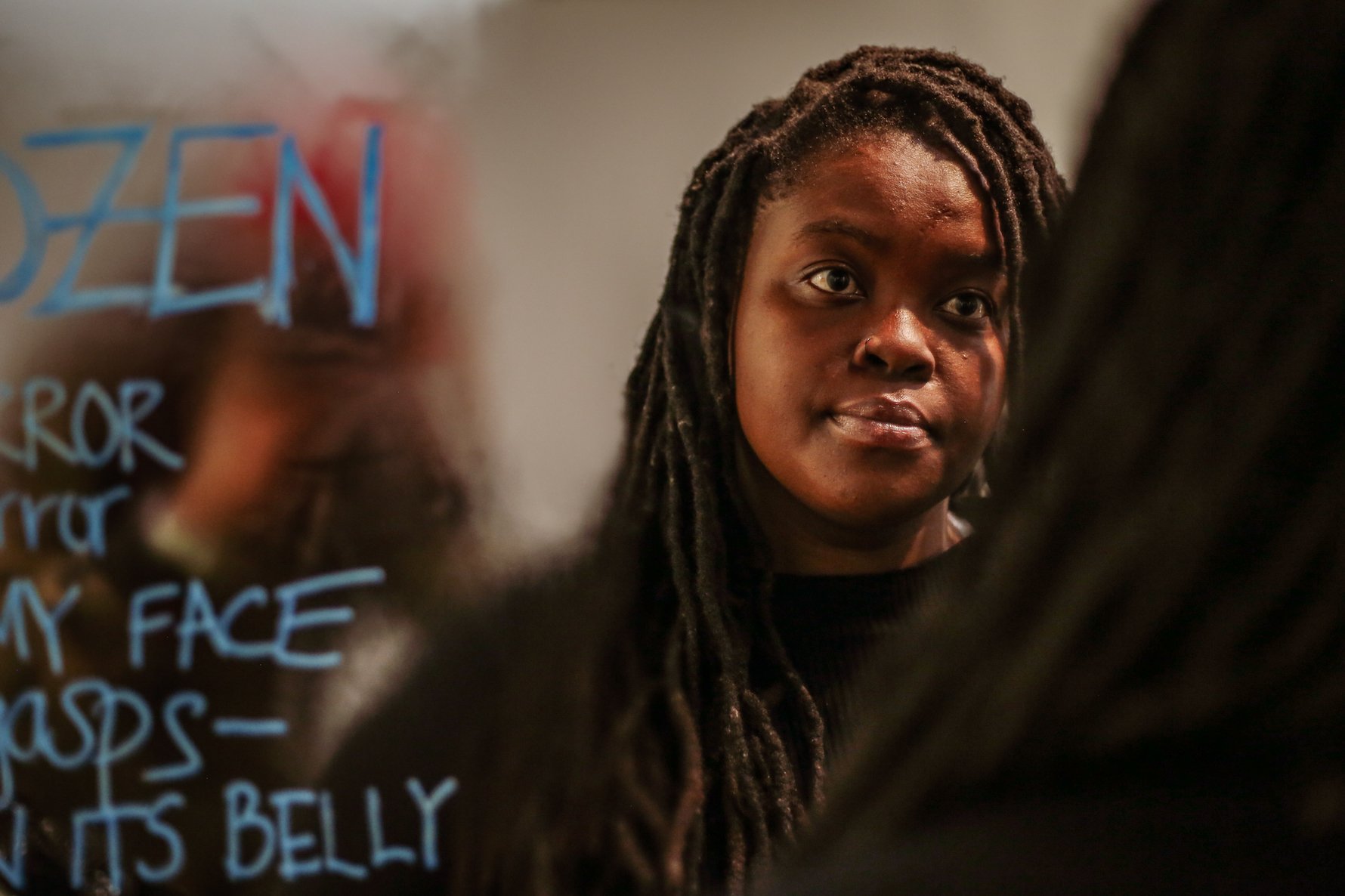
Tell us about your latest project, The Poetry Minute?
The Poetry Minute was an experiment to test the ways in which poetic text can perform itself visually; on a social media platform in a short video format. Naturally, the initiative was collaborative, but here it was the text that informed the nature of each collaboration. What we saw coming out of it was a distinct variety of unspoken and un-embodied poetry – a form unto itself. While the parameters were the same for all collaborators, the Poetry Minute series yielded a multitude of styles and treatments.
"My take: performance never lost its breath. Its breath is flaming hot with urgency."
How do we breathe life back into live performance – in this Covid era?
My take: performance never lost its breath. Its breath is flaming hot with urgency. Yes, it is probably more laboured and anxious. There is a hunger for shared space and energy between performers and audiences. Still, performance has continued across various platforms – site-specific, online, pre-recorded, experiential, etc. Accessibility and visibility, however, have drastically been reduced. That being said many of the problems that we see so clearly in the midst of COVID have always existed. Though challenging, this presents an opportunity for performance to continue to evolve in the ways it is presented, delivered, and accessed. There is a possibility to establish more sustainable platforms.
What does the Centre's work bring to Joburg that wasn't here before?
The work that comes out of the Centre is a reflection of what the space is. It is a space to test and incubate ideas without the pressure of meeting mandates, where they are allowed to unfold and even fail if that is a natural course for the process. As an artist, it is profoundly liberating to enter a space where you can realise your burning questions and ideas that are (more often than not) shelved as you seek out sustenance. The ideas that sit at the core of you and drive you; the ones that probably got you into your craft in the first place. The Centre's work feeds a certain vitality in the artistry of the city.
What do you think Joburg contributes to the creative life of your work?
Joburg is often a feature in my work (eg 'Godotlogue in Gauteng', 'Dear Mr. Government', and 'City.Space.Movement') as a source, point of reference, and/or point of comparison. The life, history, and patterns of the city and its people, as well as its ever-evolving identity. Johannesburg is also where my practice and work have taken form and lived.
Joburg in three words?
Kaleidoscope. Unyielding. Home.
Bronwyn Lace – Co-founder and Board Director at The Centre for the Less Good Idea
Bronwyn Lace is a visual artist. She collaborated with William Kentridge on the founding and establishment of The Centre for the Less Good Idea in 2016. Currently working between Austria and South Africa, her artistic practice is concerned with the relationship between art and other fields such as physics, literature, philosophy, museum practice, education, and more. Bronwyn Lace's work involves driving and facilitating The Centre's various Seasons, the FOR ONCE programme and the curation of its many online and public art projects, first as Animateur and now as a director on the board. Her role involves both working alongside the production and technical teams, as well as the invited curators, choreographers, directors, composers and dramaturgs to lead a process, and to provide a space to encourage it to unfold.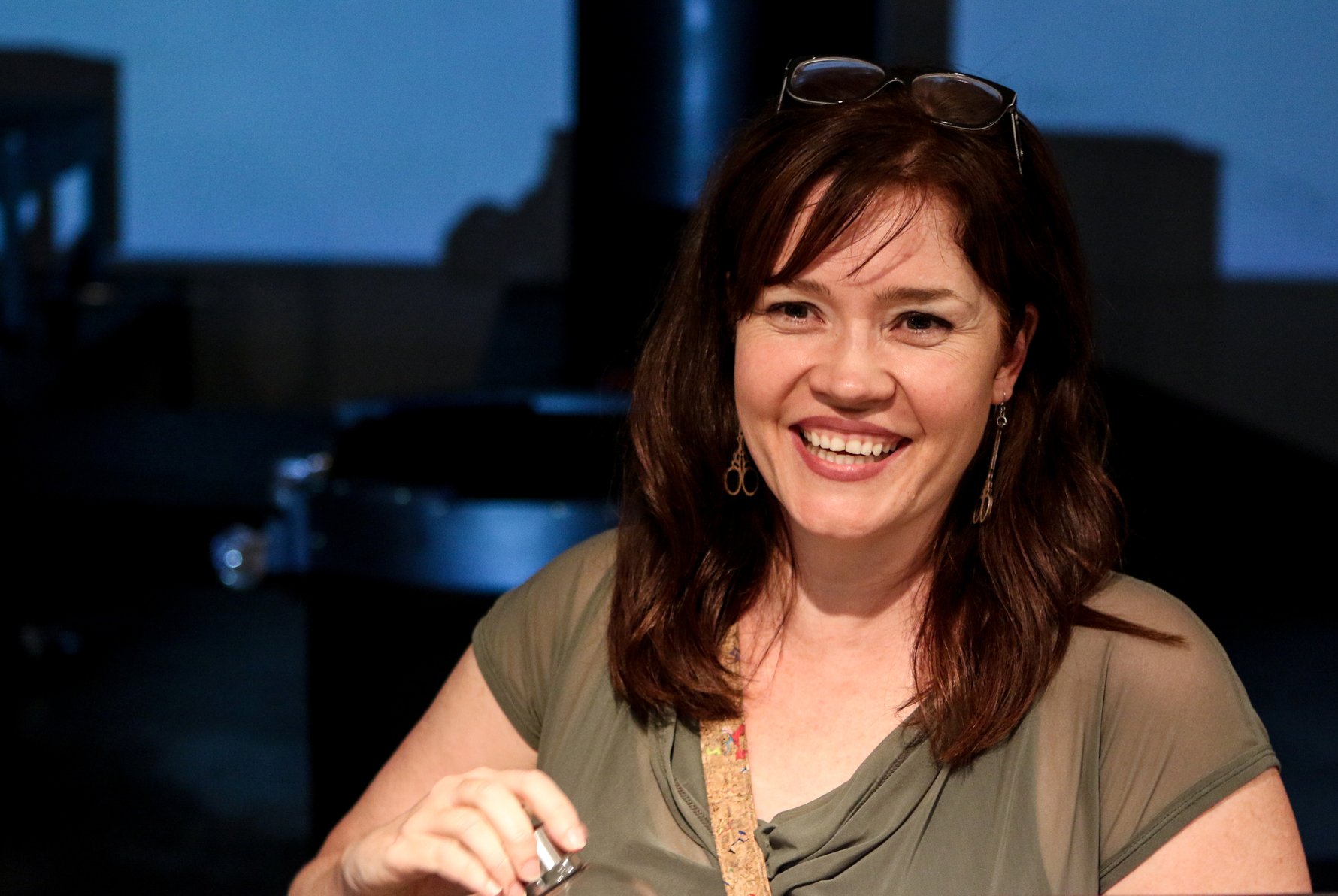
As a fellow artist living and working in Maboneng and the surrounding city area since its onset, I was invited by William Kentridge to co-think what a centre for the arts or a foundation for the arts might look like. I had the opportunity to work alongside him in conceptualising and testing the space in response to our discoveries via numerous workshops and conversations. As an independent artist I see the Centre as an extension of my own practice – that has always been interested in community outreach and broader collective thinking.
As a founder, alongside William Kentridge, which of the Centre's achievements makes you most proud?
The way the Centre has managed to become a space that is recognised, respected, and sought after. It does not function like an institution. It is a space that has managed to avoid, up until this point, the traps that organisations and institutions fall into – often of gatekeeping or a heavy administrative or bureaucratic approach. The Centre sees artists as seminal to what we are and we view each person who enters the Centre as an equal collaborator. Five years on, seven seasons later, and now into our eighth season we are maintaining that. It is something I have come to understand is rare.
"I'm aware that a day in Johannesburg invariably brings a combination of exquisite beauty and dreadfulness, and one moves between these quickly."
What are you doing now in your role that you never imagined you would enjoy when you took the job?
I don't feel that I really took a job! It's been an extension of my practice, one that has offered me enormous opportunities to think, to test, to witness. Now that I am based in Vienna, Austria, and still enjoy the close collaborative relationship that I have with the core team based in Johannesburg, I'm starting to discover a part of this role that is about introducing what the Centre does to other contexts. It's about looking at the less good idea when outside of the Centre and discovering that so much that is particularly Johannesburg, and that happens quite naturally at the Centre takes a lot more work in other parts of the world. In Europe particularly, it takes a kind of dismantling, and a humanist approach that I am finding interesting and challenging.
What do you think Joburg contributes to the creative life of your work?
I spent the first 20 years of my practice very much rooted in Johannesburg (and in downtown Johannesburg), both living and working out of those spaces. It has informed my entire identity, both as a person and as an artist. It is a space that demands innovation and collaboration, recognising who is around you and creating safe spaces together – spaces to test, and to take risks because outside of the spaces we create in Johannesburg, there is a real sense of threat.
I think that Johannesburg has informed me in its extremes. I'm aware that a day in Johannesburg invariably brings a combination of exquisite beauty and dreadfulness, and one moves between these quickly. That builds in us a kind of a flexibility, a responsiveness that is rare and that I will always be grateful for, even though Johannesburg is no longer my base.
It will always be my home because of the way it has informed my approach to my work and to my life generally.
Joburg in three words?
Generous. Collective. Communal.
Dimakatso Motholo – Project Manager for SO Academy and The Centre for the Less Good Idea
Dimakatso Motholo is a performing artist, researcher in cultural policy and arts management, and is the Project Manager for SO | Academy and The Centre for the Less Good Idea. Born in the Free State and raised on the East Rand, she studied dramatic arts and arts management at Wits University and holds a Masters degree in Cultural Policy and Management. Before becoming Project Manager, Dimakatso Motholo worked for the Centre as a stage manager and administrator.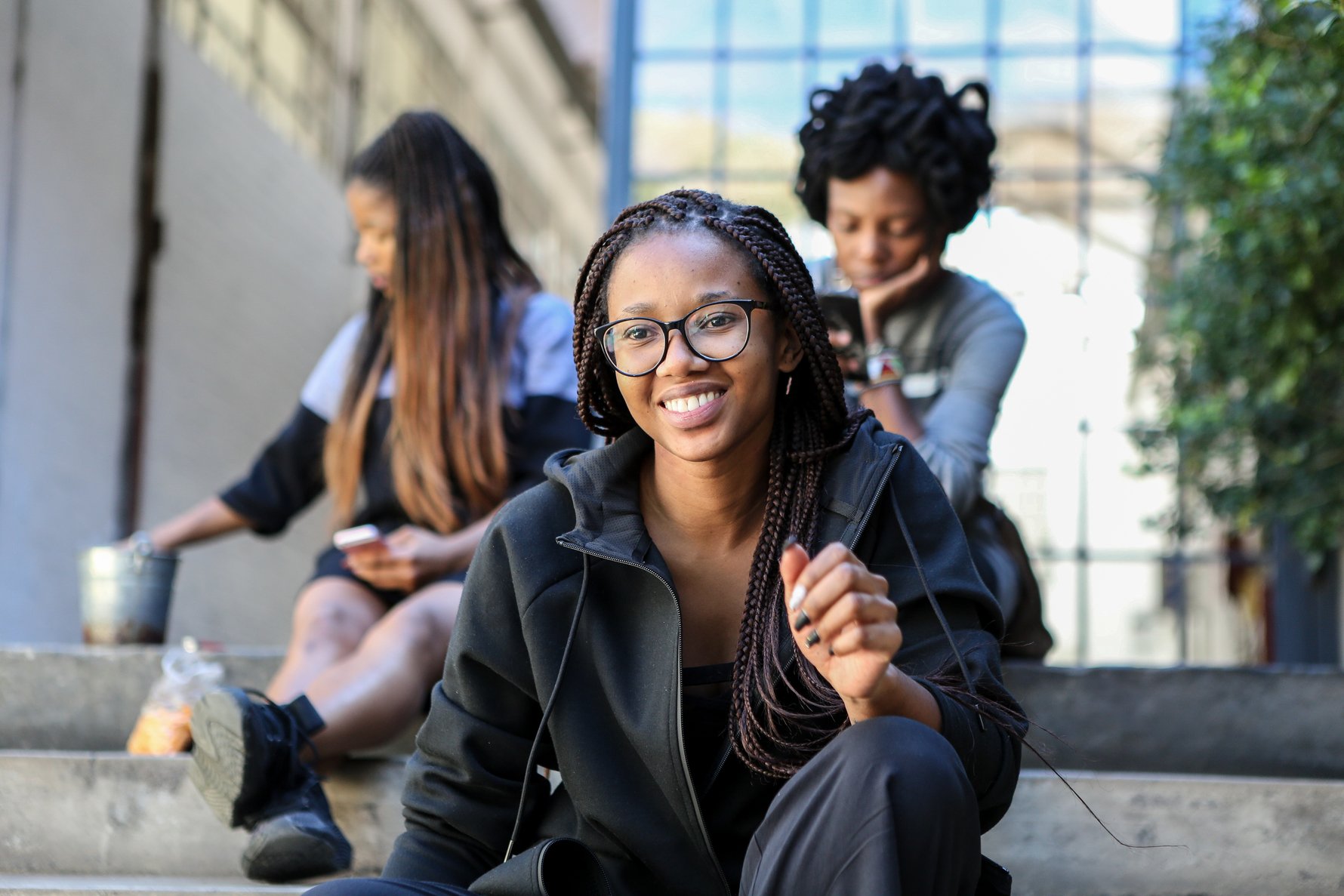
Lately, the following words have been resonating with me: the reward of being good at your work is more work. Every day is a challenge at the Centre, regardless of what role you occupy. I started working at the Centre in a hybrid position anyway so having multiple portfolios was nothing new. I have days when I feel like the hours are not enough or I wish I could divide myself and give each self a responsibility. Yeah, I think that's my challenge, there's only one ME and so much to do but I find joy in getting things done. So my ability to get things done feels more like growth as opposed to feeling like I'm being stretched thin.
Do you sometimes wish for a hierarchical structure?
I used to but realised its limits. In those times when I sought the hierarchical structure, it was coming from a place of frustration because of my hybrid position but also that position is afforded by the lack of the hierarchical structure. I don't think I would've grown so much in such a short time if there was a hierarchical structure at the Centre. I've worked for and with organisations that have a hierarchical structure and it sometimes limits growth for the work and the individuals involved (it's like a stumbling block sometimes). I found that it made things predictable and stagnant. I work a 9-5 at the Centre but every day is different. Don't get me wrong, we do have structure but it's the kind that doesn't suffocate one.
"Lately, the following words have been resonating with me: the reward of being good at your work is more work."
What achievement at The Centre are you proudest of to date?
I am proud of everything I do and what the Centre does. I can't isolate a moment because I believe that every moment contributes to the existence of the Centre. It's still a baby compared to other organisations and what they have achieved, but it holds its own. We are a small team and yet we do so much. I think just being at the Centre, to be able to say I am part of the core team is an achievement on its own.
What do you think Joburg contributes to the creative life of your work?
Joburg feels like a slice of the world in one place. It's the people for me. The people in its various spaces offer different perspectives.
Joburg in three words?
Chemistry. Intense. Maboneng.
Upile Chisala – Founder of the Khala Series
Raised in Zomba, Malawi, Upile Chisala is a storyteller, sociologist and activist who holds two Master’s degrees from Oxford University in African Studies and Medical Anthropology. Chisala tells stories from the margins and through her poetry and prose helps others and herself come to terms with pasts, celebrate presents and confidently dream beautiful futures through affirming, empowering and encouraging writing on joy, identity, spirituality, femininity, beauty, love and loss. At the Centre Chisala has collaborated on the Highway Notice Project of public installations and on the Poetry Minute series. She is also a founder and mentor of the Khala Series and as part ofn this is currently collaborating on the 100 Poem Project, an anthology of 100 poems by 25 black women and black nonbinary persons.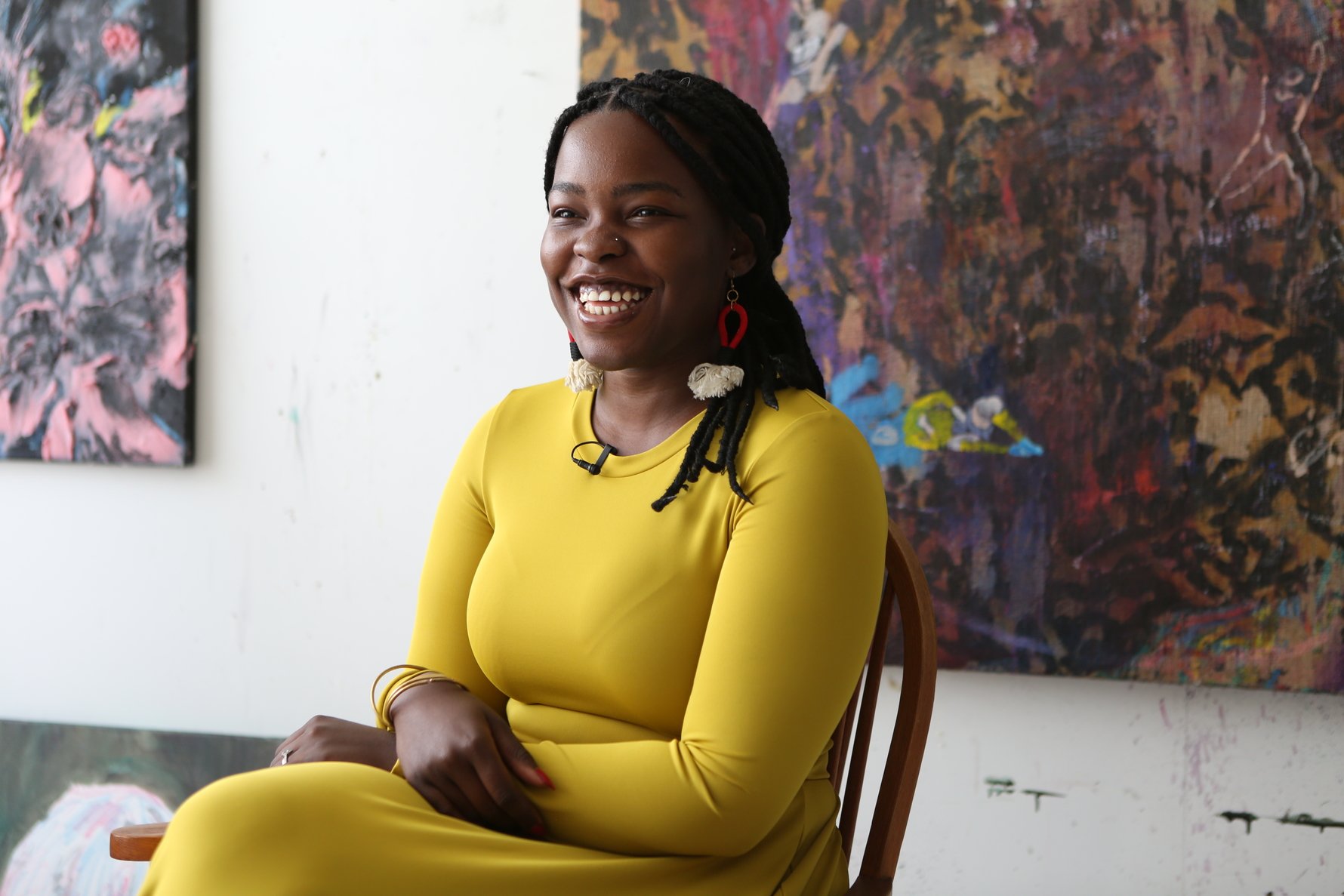
Tell us about the poetry anthology you are working on
Khala Series is a writing mentorship program I started in 2019. I meant for it to be a physical space in Joburg where upcoming writers meet, learn and share. The pandemic threw a wrench in this year's plans so I decided to create an anthology that would comprise of 100 poems from writers from all over the world. After receiving over 500 applications, 25 poets were selected. This application invited black women and black nonbinary persons to submit four of their previously unpublished poems. Khala Series was lucky enough to collaborate on this project with The Centre for the Less Good Idea because we both believe in uplifting creatives and creating opportunities for their work to be shared widely. This anthology has poems that cover a wide variety of themes, from heritage to intergenerational trauma, love and friendship.
"I deeply believe in radical rest and radical softness for black women in particular. I feel like our lives have been riddled with this strange need to be strong and carry these heavy burdens."
You are just a few hundred tweets short of 100,000 on your Twitter account. What attracts you to this medium?
I didn't even realize I've tweeted that much. I think Twitter has been like a journal to me and to others. I write short poems, so this platform that allows you to share short thoughts has always aligned with my soul.
As a storyteller, where do you draw inspiration from?
Everything I have ever written is heavily inspired by the lives of women. I put women at the centre of my work. I come from a line of hardworking resilient women and I think I write soft poems to honour them. I deeply believe in radical rest and radical softness for black women in particular. I feel like our lives have been riddled with this strange need to be strong and carry these heavy burdens. My writing is a place, I hope, where women can lay these things down.
What do you think Joburg contributes to the creative life of your work?
Joburg is always teaching me something, whether I like it or not. Moving through this city rich with stories has been a blessing to my work. Before the pandemic, I was always surrounded by creative people and their processes. People gather for art in Joburg, they gather and open their hearts to it. As a poet, I was afraid of empty rooms but Joburg's reading culture has surprised me time and time again, people always show up to listen and be listened to. My work has never been received or held the way it has been in Joburg. Joburg hugs my poems and I am absolutely delighted. Beyond the gathering, every weekend I go hiking and find such joy in all the nature Joburg has to offer. This act of being in the parks and among the trees has given me silence in a bustling city and a poet needs silence.
Joburg in three words?
Alive. Full. Surprising.


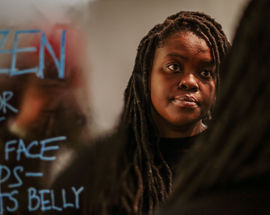
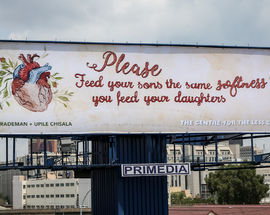
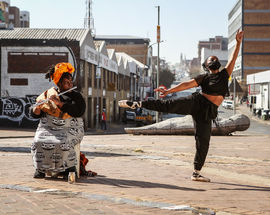
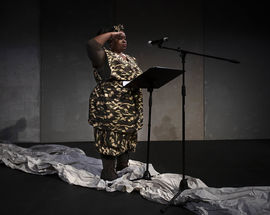


Comments